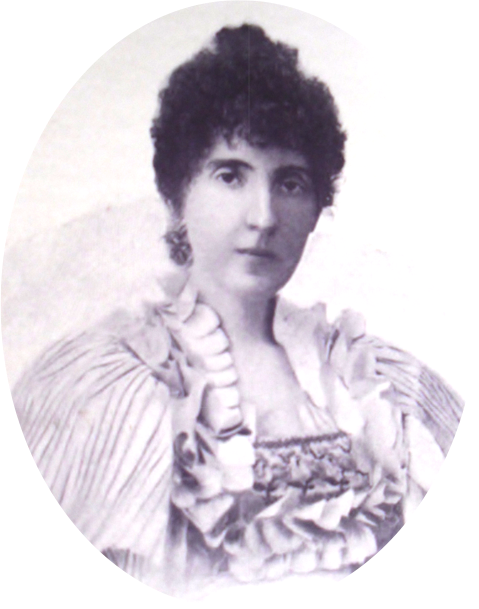

Cláudia de Campos was born in Sines (a city situated in Portugal´s Setúbal district), in 28 january of 1859.
She became linked to the pacifist and feminist movements that erupted in Portugal during the early years of the twentieth century. In this sense, she integrated, in 1906, the board of the Feminist Section of the Portuguese League of Peace and was appointed, in that same year, Vowel of the Portuguese Committee of the French guild La Paix et le Désarmement par les Femmes.
A few years earlier, Cláudia de Campos had already distinguished herself in the Portuguese literary sphere, having published the following works: Rindo (Laughing) and O Último Amor (The Last Love), in 1894; Mulheres: Ensaios de Psicologia Feminina (Women: Essays on Female Psychology), in 1895; A Esfinge (The Sphinx), in 1897; Ele (Him), in 1899; A Baronesa de Stâel (The Baroness of Stâel) and O Duque de Palmela (The Duke of Palmela), in 1901. She also prepared, in manuscript, a study focused on the poet Shelley, a notorious rival of Byron´s.
However, it was through her involvement in the feminist circles that she would obtain the highest acknowledgement as a writer: using the pseudonym Colette, Campos collaborated with the O Almanaque das Senhoras (The Ladies´Almanac), in 1892, 1893, 1896 and 1898, with the A Sociedade Futura (The Future Society) magazine, between 1902 and 1904 – where Olga de Morais Sarmento da Silveira would even write her biography -, with the Jornal da Mulher (The Women´s Newspaper) – to which she contributed with a chapter of the aforementioned study about Shelley – and also with the Jornal das Senhoras (The Ladies´ Newspaper), between 1904 and 1905.
Virgínia Quaresma, another prominent activist of the time, referred to Cláudia de Campos as a “sincere feminist”, in allusion to the several articles on feminism that Campos published, which would eventually be compiled in the previously cited work Women: Essays on Female Psychology.
She died in Lisbon, on the 30th of December of 1916, and her passing was largely ignored by the periodicals of the time, not only due to the fact that she abandoned, during her last years, the publishing of texts, but mostly as a result of her self-imposed social isolation. In fact, such omission was noted by the A Semeadora (The Sower) magazine – owned by the Association of Feminist Propaganda -, which did not forget to underline the tremendous loss, for the country, of a remarkable writer.
Cláudia de Campos nasceu em Sines, em 28 de janeiro de 1859.
Associou-se aos movimentos pacifistas e feministas que eclodiram em Portugal durante os primeiros anos do séc. XX. Nesse sentido, integrou, em 1906, a direcção da Secção Feminina da Liga Portuguesa da Paz e foi eleita, nesse mesmo ano, Vogal do Comité Português da agremiação francesa La Paix et le Désarmement par les Femmes.
Alguns anos antes, Cláudia de Campos já se havia notabilizado através da sua actividade literária, tendo publicado as seguintes obras: Rindo (obra de estreia, tratando-se de uma compilação de contos prefaciada por Bulhão Pato) e O Último Amor, em 1894; Mulheres: Ensaios de Psicologia Feminina, em 1895; A Esfinge (dedicada a Julieta Adam), em 1897; Ele, em 1899; A Baronesa de Stâel e O Duque de Palmela, em 1901. Elaborou também, em manuscrito, um estudo focado no poeta Shelley, célebre rival de Byron.
Contudo, foi por intermédio do seu envolvimento no meio feminista que acabaria por obter maior reconhecimento enquanto escritora: tendo recorrido ao pseudónimo Colette, colaborou com O Almanaque das Senhoras, em 1892, 1893, 1896 e 1898, com a revista A Sociedade Futura, entre 1902 e 1904, onde seria inclusivamente biografada por Olga de Morais Sarmento da Silveira, com o Jornal da Mulher – para o qual contribuiu com um capítulo do supracitado estudo acerca de Shelley – e com o Jornal das Senhoras, entre 1904 e 1905.
Virgínia Quaresma, outra proeminente activista da época, referiu-se a Cláudia de Campos como uma “feminista sincera”, em alusão aos vários artigos que Campos publicou sobre feminismo e que acabariam por ser compilados na já referida obra Mulheres: Ensaios de Psicologia Feminina (1895).
Morreu em Lisboa, a 30 de Dezembro de 1916, tendo o seu desaparecimento sido largamente ignorado pelos periódicos da época, não só por ter abandonado, durante os seus últimos anos de vida, a publicação de textos, mas sobretudo devido ao isolamento social a que se submeteu. Tal omissão, de resto, haveria de ser apontada pela revista A Semeadora, pertencente à Associação de Propaganda Feminista, que não deixou de sublinhar a tremenda perda para o país de uma notável escritora.
References:
- Cláudia de Campos, wikipédia.
- Women Writers in History Database, Cláudia de Campos.
- Cláudia de Campos, património imaterial - Câmara Municipal de Sines.
- NEWW Conference - Centennial of Cláudia de Campos.
- CASTRO, Zília, ESTEVES, João (dir.), Dicionário no Feminino (séculos XIX-XX), Lisboa, Livros Horizonte, 2005.
- OLIVEIRA, A. Lopes de, Escritoras Brasileiras, Galegas e Portuguesas, Lisboa, Editorial Caminho, 1993.